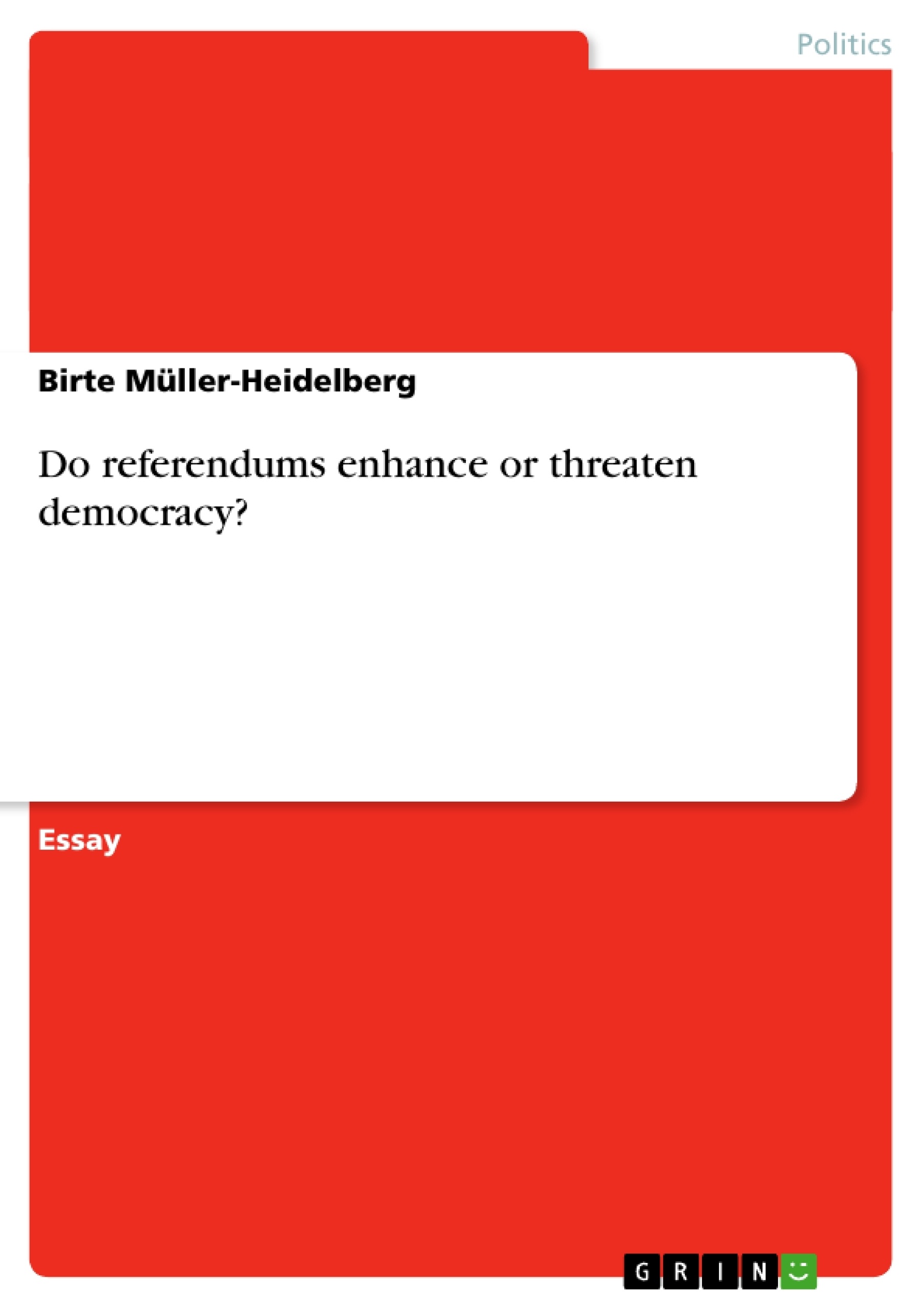In some countries, the Euro has been established without consulting the citizens.
Discussions on whether this has been a fair and fully legal step made by elected
representatives in a democracy or whether people should have been asked before
passing such a major reform are ongoing.
The convent has come up with a first proposal for a European Constitution. While
several countries are preparing their referendums on it, Germany’s chancellor Gerhard
Schröder simply stated, he is against a referendum – no reasons given.
Switzerland uses referendums as a regular instrument to let people decide about single
political issues. Countries as Sweden and Denmark use them at least once in a while.
Others, such as Germany, have never had a referendum in their history.
Although these differences between nation states are obvious, there has been a revival
of the idea of referendums as an instrument of direct democracy in the last decades. In
some states used, in others only discussed, referendums are a topic again. This essay
analyses the question whether referendums enhance or threaten democracy by taking
a closer look at the pro and contra arguments used in the literature, essays and
newspaper articles through which sociologists fight their battle about the subject.
After pointing out some of the reasons for the current rise of referendums in general
(2), chapter 3 will deal with the chances (3.1) and dangers (3.2) of referendums. This
analysis will lead to a conclusion and judgement of referendums (4). In chapter 5, a
short outlook will be given on the function of referendums in the ever closer European
Union.
Inhaltsverzeichnis (Table of Contents)
- Introduction
- Representative democracy and the rise of referendums
- Evaluating the impact of referendums
- Chances of referendums
- Maximizing participation
- Separating issues
- Dangers of referendums
- Lacking knowledge of voters
- Suppressing minorities
- Weakening the government
- Manipulating the masses
- Chances of referendums
- Conclusion
- Referendums on Europe
Zielsetzung und Themenschwerpunkte (Objectives and Key Themes)
This essay explores the growing use of referendums and their impact on democracy. It analyzes the pro and contra arguments surrounding referendums, considering their potential to enhance or threaten democratic principles. The essay investigates the historical context, examines the theoretical framework of referendums in representative democracy, and evaluates both the advantages and disadvantages of their implementation.
- The rise of referendums as a counter-development to declining trust in politicians and the transfer of national powers to European organizations.
- The potential benefits of referendums, including increased citizen participation in politics and the separation of complex issues for direct public decision-making.
- The potential risks associated with referendums, such as the possibility of voter manipulation, suppression of minority interests, and the weakening of government authority.
- The role of referendums in the context of the European Union and the implications for democratic processes at the supranational level.
Zusammenfassung der Kapitel (Chapter Summaries)
The introduction sets the stage for the discussion by highlighting the ongoing debate surrounding the use of referendums in modern democracies. It emphasizes the need for an in-depth analysis of the potential benefits and risks associated with referendums.
Chapter 2 delves into the historical context of referendums, contrasting the idea of direct democracy with the current model of representative democracy. It examines the reasons behind the shift towards representative democracy, focusing on the increasing complexity of modern societies and the challenges of managing large political entities. The chapter also analyzes the recent resurgence of interest in referendums as a means of direct democracy.
Chapter 3 evaluates the potential benefits and risks of referendums. It explores the potential for referendums to increase citizen participation in politics and their ability to provide a platform for direct decision-making on complex issues. The chapter also examines the dangers of referendums, including the potential for voter manipulation, suppression of minority interests, and the weakening of government authority. It emphasizes the importance of considering these risks in the context of implementing referendums.
Schlüsselwörter (Keywords)
The primary focus of this essay lies on the topic of referendums, examining their increasing presence within modern democracies. It delves into the potential impact of referendums on democratic processes, exploring both their advantages and disadvantages. Key terms and concepts include direct democracy, representative democracy, citizen participation, political trust, voter manipulation, minority rights, and government authority.
Frequently Asked Questions
Do referendums strengthen or weaken democracy?
The essay analyzes both sides: referendums can enhance democracy by increasing participation, but they can also threaten it through voter manipulation or minority suppression.
Why has there been a rise in referendums recently?
The increase is seen as a reaction to declining trust in elected politicians and the transfer of national powers to supranational organizations like the EU.
What are the main dangers of direct democracy via referendums?
Key risks include the potential lack of voter knowledge, the suppression of minority interests, and the weakening of government authority.
How does Switzerland differ from Germany regarding referendums?
Switzerland uses referendums regularly for single political issues, while Germany has historically avoided them at the national level.
What role do referendums play in the European Union?
They are often used to ratify major reforms, such as the European Constitution, though their use varies significantly between member states.
- Citation du texte
- Birte Müller-Heidelberg (Auteur), 2003, Do referendums enhance or threaten democracy?, Munich, GRIN Verlag, https://www.grin.com/document/19651



